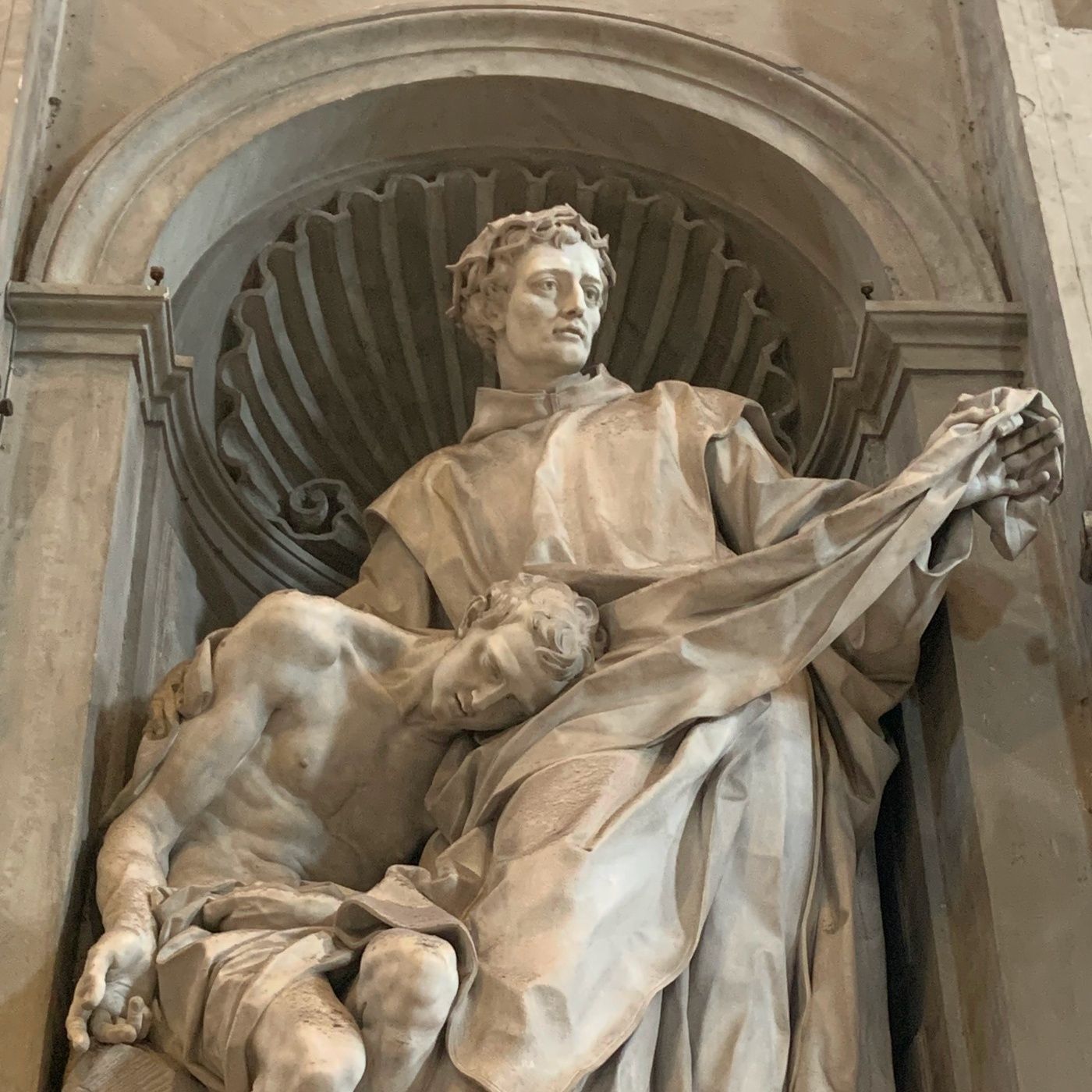
March 8: Saint John of God, Religious
1495–1550
Optional Memorial; Liturgical Color: White (Violet when Lenten Weekday)
Patron Saint of hospitals, printers, the sick, and alcoholics
He walked the fine line between madness and holiness
There are many “Johns” who are saints, beginning with those found in Scripture itself: Saint John the Baptist, Saint John the Evangelist, Saint John of the Cross, Saint John Fisher, etc. The name John has also been taken by many popes. Today’s John has the title “of God.” It is a simple and direct title. The word “God” conveys everything under God and everything that is God, without distinctions such as “of the Cross,” “of the Holy Name,” or “of the Infant Jesus.” Neither does it carry any hint of a homeland such as “of Assisi,” “of Calcutta,” or “of Padua.” All saints are “of God,” of course, but the plain title “of God” fits the personality, outlook, education, and simplicity of today’s John very well. The name was not given to him posthumously. John said that the Infant Jesus gave him the name in a dream. A Spanish Bishop who personally knew John and his work ordered him to bear this appellation once he knew its divine origins.
Saint John of God did not have the advantage of an excellent education. But what his mind lacked his heart supplied. He left his Portuguese home as a child in the care of a priest and went to neighboring Spain. From there he lived an itinerant life as a farmer, shepherd, adventurer, and then soldier. He travelled the length and breadth of Europe fighting in the service of kings and princes, mostly against Muslim Turks. Many years later he found his way back home and went to see if his parents were still alive. But he had been gone so long, and had left so young, that he could not even remember their names. An uncle told him that they had died. At this point, the wandering John decided to ransom his own freedom to North African Muslims in exchange for Christian hostages. The plan came to nothing and he returned to Southern Spain.
At this, the lowest point of his aimless life, John had a breakthrough, or perhaps a breakdown. He was selling religious books from town to town when he fell under the influence of a saint, John of Ávila. Saints know saints. Upon hearing John of Ávila preach about the martyr Saint Sebastian, and upon receiving his advice in spiritual direction, the wandering John stopped in his tracks. He fasted, he prayed, and he went on pilgrimage to the Shrine of Our Lady of Guadalupe in Extremadura, Spain. So total was his repentance for his past sins that he was placed for a time in a hospital for the mentally ill. But his repentance was real. He changed forever and always and started caring for the kind of person that he used to be.
John somehow raised enough money to start a small hospital and thus began, in an orderly and professional manner, to care for the sick, feed the hungry, clothe the naked, convert the sinner, and shelter the homeless and orphans. He had no equal in giving of himself to his patients, and his reputation for holiness spread across Spain. He gave away his cloaks so often that his Bishop had a habit made, ordered John to put it on, and told him not to give it away. John’s total dedication to the poor and sick drew many followers. They emulated his generosity, and soon an Order was born. The group was eventually approved by the Holy See in 1572 under the title The Brothers Hospitallers of Saint John of God. The Order spread quickly throughout the world, often with the support of the Spanish Crown. Its work on behalf of the poor continues today in numerous countries through hundreds of institutions.
Saint John of God practiced a type of Ignatian spirituality in evaluating his own life. But he was not just a spectator of his life, observing it from the outside. He became a student of himself, evaluated his own errors, listened to advice, stopped what he was doing, changed direction, and charted a new course in middle age. He was, in modern terms, a “late vocation.” He cared little for his own physical health and died on his fifty-fifth birthday while kneeling in prayer before an altar in his room. In some saints there is a fine line between sanctity and madness. Saint John of God straddled that fine line. He became mad for the Lord and was canonized by the Church for his holy madness in serving the poor and the God who loves them.
Saint John of God, help us to follow your example of service to the poor through gift of self. You did not just ask for charitable donations but for charity itself. You did not ask others to do what you did not do yourself. Through your intercession, may all those in need encounter a servant as generous as yourself to satisfy their basic needs.
view more
1495–1550
Optional Memorial; Liturgical Color: White (Violet when Lenten Weekday)
Patron Saint of hospitals, printers, the sick, and alcoholics
He walked the fine line between madness and holiness
There are many “Johns” who are saints, beginning with those found in Scripture itself: Saint John the Baptist, Saint John the Evangelist, Saint John of the Cross, Saint John Fisher, etc. The name John has also been taken by many popes. Today’s John has the title “of God.” It is a simple and direct title. The word “God” conveys everything under God and everything that is God, without distinctions such as “of the Cross,” “of the Holy Name,” or “of the Infant Jesus.” Neither does it carry any hint of a homeland such as “of Assisi,” “of Calcutta,” or “of Padua.” All saints are “of God,” of course, but the plain title “of God” fits the personality, outlook, education, and simplicity of today’s John very well. The name was not given to him posthumously. John said that the Infant Jesus gave him the name in a dream. A Spanish Bishop who personally knew John and his work ordered him to bear this appellation once he knew its divine origins.
Saint John of God did not have the advantage of an excellent education. But what his mind lacked his heart supplied. He left his Portuguese home as a child in the care of a priest and went to neighboring Spain. From there he lived an itinerant life as a farmer, shepherd, adventurer, and then soldier. He travelled the length and breadth of Europe fighting in the service of kings and princes, mostly against Muslim Turks. Many years later he found his way back home and went to see if his parents were still alive. But he had been gone so long, and had left so young, that he could not even remember their names. An uncle told him that they had died. At this point, the wandering John decided to ransom his own freedom to North African Muslims in exchange for Christian hostages. The plan came to nothing and he returned to Southern Spain.
At this, the lowest point of his aimless life, John had a breakthrough, or perhaps a breakdown. He was selling religious books from town to town when he fell under the influence of a saint, John of Ávila. Saints know saints. Upon hearing John of Ávila preach about the martyr Saint Sebastian, and upon receiving his advice in spiritual direction, the wandering John stopped in his tracks. He fasted, he prayed, and he went on pilgrimage to the Shrine of Our Lady of Guadalupe in Extremadura, Spain. So total was his repentance for his past sins that he was placed for a time in a hospital for the mentally ill. But his repentance was real. He changed forever and always and started caring for the kind of person that he used to be.
John somehow raised enough money to start a small hospital and thus began, in an orderly and professional manner, to care for the sick, feed the hungry, clothe the naked, convert the sinner, and shelter the homeless and orphans. He had no equal in giving of himself to his patients, and his reputation for holiness spread across Spain. He gave away his cloaks so often that his Bishop had a habit made, ordered John to put it on, and told him not to give it away. John’s total dedication to the poor and sick drew many followers. They emulated his generosity, and soon an Order was born. The group was eventually approved by the Holy See in 1572 under the title The Brothers Hospitallers of Saint John of God. The Order spread quickly throughout the world, often with the support of the Spanish Crown. Its work on behalf of the poor continues today in numerous countries through hundreds of institutions.
Saint John of God practiced a type of Ignatian spirituality in evaluating his own life. But he was not just a spectator of his life, observing it from the outside. He became a student of himself, evaluated his own errors, listened to advice, stopped what he was doing, changed direction, and charted a new course in middle age. He was, in modern terms, a “late vocation.” He cared little for his own physical health and died on his fifty-fifth birthday while kneeling in prayer before an altar in his room. In some saints there is a fine line between sanctity and madness. Saint John of God straddled that fine line. He became mad for the Lord and was canonized by the Church for his holy madness in serving the poor and the God who loves them.
Saint John of God, help us to follow your example of service to the poor through gift of self. You did not just ask for charitable donations but for charity itself. You did not ask others to do what you did not do yourself. Through your intercession, may all those in need encounter a servant as generous as yourself to satisfy their basic needs.
More Episodes
November 11: Saint Martin of Tours, Bishop
 2024-11-11
2024-11-11
 2024-11-11
2024-11-11
November 4: Saint Charles Borromeo, Bishop
 2024-11-04
2024-11-04
 2024-11-04
2024-11-04
November 1: All Saints
 2024-10-29
2024-10-29
 2024-10-29
2024-10-29
October 28: Saints Simon and Jude, Apostles
 2024-10-24
2024-10-24
 2024-10-24
2024-10-24
October 23: Saint John of Capistrano, Priest
 2024-10-23
2024-10-23
 2024-10-23
2024-10-23
October 22: Saint John Paul II, Pope
 2024-10-22
2024-10-22
 2024-10-22
2024-10-22
October 18: Saint Luke, Evangelist
 2024-10-18
2024-10-18
 2024-10-18
2024-10-18
October 11: Saint John XXIII, Pope
 2024-10-10
2024-10-10
 2024-10-10
2024-10-10
012345678910111213141516171819
Create your
podcast in
minutes
- Full-featured podcast site
- Unlimited storage and bandwidth
- Comprehensive podcast stats
- Distribute to Apple Podcasts, Spotify, and more
- Make money with your podcast
It is Free
- Privacy Policy
- Cookie Policy
- Terms of Use
- Consent Preferences
- Copyright © 2015-2024 Podbean.com






